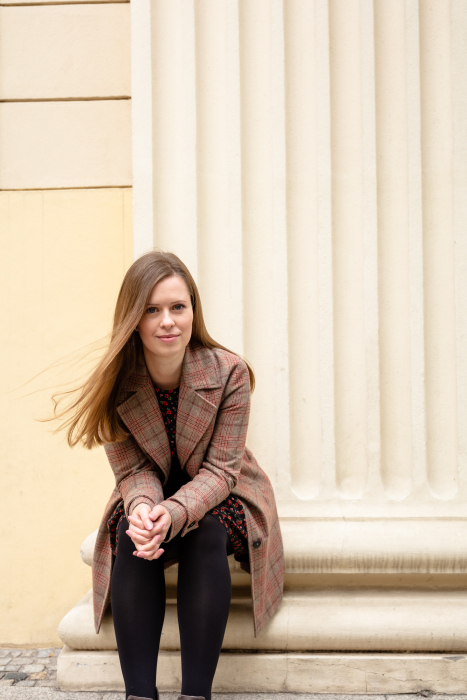 Żydoteka, czyli dlaczego warto czytać literaturę żydowską.
Żydoteka, czyli dlaczego warto czytać literaturę żydowską.
Maja Chitro
 foto: Grzegorz Gołębiowski
foto: Grzegorz Gołębiowski
Literatura żydowska, szczególnie ta historyczna, wzbudza w Polsce wciąż wiele emocji. A co z literaturą piękną? Tu sprawa się komplikuje. Ale wtedy na pomoc przychodzi Urszyla Rybicka – znana w sieci jako Żydoteka.
„Bo nie ma nic tak gorzkiego albo tak słodkiego jak prawda”, pisał Isaac Bashevis Singer w „Opowieści o Królu Pól”. O niego m.in. pytam Urszulę Rybicką, publicystkę, tłumaczkę i założycielkę Żydoteki. Stamtąd czerpię wiedzę na temat literatury żydowskiej, która w Polsce, mam wrażenie, wciąż nie jest wystarczająco popularna. Dlaczego?
W moim domu literatura żydowska była obecna od zawsze. Amosa Oza podsunęła mi jeszcze w dzieciństwie mama. Tata streszczał mi przez telefon „Zaczarowanego krawca i inne humoreski” Szolema Alejchema. Potem sama już czytałam autorów o żydowskich korzeniach: Paula Celana, Waltera Benjamina, Franza Kafkę. A Ty od kogo radziłabyś zacząć?
URSZULA RYBICKA: Trudno o lepszych nauczycieli niż Kafka czy Celan, choć są wymagający. Z autorów izraelskich zawsze polecam klasyków – Amosa Oza i Dawida Grosmana, wyśmienite powieści piszą Zeruya Shalev czy Eshkol Nevo. Wart odnotowania jest Sayed Kashua, jeden z niewielu Palestyńczyków tworzących po hebrajsku.
Zauważ, że wśród moich pierwszych kontaktów z tą literaturą nie ma żadnych kobiet. Betty Friedan czy Gertrude Stein poznałam w okolicznościach związanych z feminizmem lub historią sztuki.
Brak lub mała reprezentacja kobiet jest typowa dla każdej kultury zdominowanej przez mężczyzn. Dobrze, że mamy dziś świadomość tego, jak ważne w patriarchalnym świecie są głosy artystek takich jak poetka Zuzanna Ginczanka czy nowelistka Ester Singer Kreitman – starsza siostra pisarzy Isaaca i Israela Singerów. Poruszającą lekturą z czasów wojny są także dzienniki Anne Frank i Reni Spiegel.
A co z pisarkami współczesnymi?
Odważne głosy Dorit Rabinyan, Ayelet Gundar-Goshen i Sary Shilo są niezwykle celne, a ich opisy Izraela pokazują, jak skomplikowany i wielowarstwowy jest dziś żydowski świat.
Który z tych autorów zrobił na Tobie szczególne wrażenie?
Momentem przełomowym była dla mnie lektura opowiadania Etgara Kereta „Rury”, które chwyciło mnie za serce. Postanowiłam dowiedzieć się wszystkiego o tym pisarzu, pomyślałam też, że skoro tak dobrze pisze, to kto wie, może w tym Izraelu jest więcej takich jak on?
O tym wszystkim opowiadasz na profilu Żydoteki.
Profil powstał kilka lat temu – już od jakiegoś czasu recenzowałam żydowską literaturę, dlatego postanowiłam robić zdjęcia okładkom, by publikować je na Instagramie i Facebooku. Szybko się okazało, że wiele osób interesuje ta kultura, więc rozwinęłam profil tak, żeby były to też opowieści o książkach. Ostatecznie Żydoteka stała się tym, czego sama kiedyś szukałam – miejscem, gdzie można znaleźć nie tylko informacje o nowościach, ale też poznać klasykę i najważniejszych pisarzy, kulisy żydowskiego świata literackiego czy wciąż nie do końca odkrytą współczesną literaturę Izraela. Pokazuję życie, które odrodziło się po Zagładzie i ma swoją kontynuację. Jest to już kultura odmienna od tego, co znamy choćby z opowiadań Singera, ale wciąż czerpie z historycznego dorobku.
Zawartość publikowanych artykułów i materiałów nie reprezentuje poglądów ani opinii Reunion’68,
ani też webmastera Blogu Reunion’68, chyba ze jest to wyraźnie zaznaczone.
Twoje uwagi, linki, własne artykuły lub wiadomości prześlij na adres:
webmaster@reunion68.com




